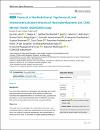Protocol of the Nutritional, Psychosocial, and Environmental Determinants of Neurodevelopment and Child Mental Health (COINCIDE) study
| المؤلف | Lobo, Eunice |
| المؤلف | R, Deepa |
| المؤلف | Mandal, Siddhartha |
| المؤلف | Menon, Jyothi S. |
| المؤلف | Roy, Aditi |
| المؤلف | Dixit, Shweta |
| المؤلف | Gupta, Ruby |
| المؤلف | Swaminathan, Sumathi |
| المؤلف | Thankachan, Prashanth |
| المؤلف | Bhavnani, Supriya |
| المؤلف | Divan, Gauri |
| المؤلف | Prabhakaran, Poornima |
| المؤلف | van Schayck, Onno C.P. |
| المؤلف | Babu, Giridhara Rathnaiah |
| المؤلف | Srinivas, Prashanth Nuggehalli |
| المؤلف | Mukherjee, Debarati |
| تاريخ الإتاحة | 2025-02-16T09:52:28Z |
| تاريخ النشر | 2024-01-01 |
| اسم المنشور | Wellcome Open Research |
| المعرّف | http://dx.doi.org/10.12688/wellcomeopenres.22817.2 |
| الاقتباس | Lobo E, R. D, Mandal S et al. Protocol of the Nutritional, Psychosocial, and Environmental Determinants of Neurodevelopment and Child Mental Health (COINCIDE) study [version 2; peer review: 2 approved]. Wellcome Open Res 2024, 9:486 (https://doi.org/10.12688/wellcomeopenres.22817.2) |
| الملخص | Background: Over 250 million children are developing sub-optimally due to their exposure to early life adversities. While previous studies have examined the independent effects of nutritional status, psychosocial adversities, and environmental pollutants on children’s outcomes, little is known about their interaction and cumulative effects. Objectives: This study aims to investigate the independent, interaction, and cumulative effects of nutritional, psychosocial, and environmental factors on children’s cognitive development and mental health in urban and rural India. It also seeks to explain pathways leading to inequities in child outcomes at the individual, household, and neighbourhood levels. Methods: A mixed-methods prospective cohort study will be conducted on 1600 caregiver-child dyads (child age 3–10 years) in urban and rural India. Nutritional status, psychosocial adversities, environmental pollutants, and child mental health outcomes will be assessed using parent-report questionnaires. Performance-based measures will be used to assess cognitive outcomes. Venous blood and urine samples will be used to measure nutritional and pesticide biomarkers in 500 children. Indoor air pollution will be monitored in 200 households twice, during two seasons. Multilevel regression, weighted quantile sum regression, and Bayesian kernel machine regression will assess the individual and combined effects of exposures on child outcomes. Thematic analysis of in-depth interviews and focus group discussions will explore pathways to middle-and late childhood development inequities. Discussion: The data will be used to formulate a Theory of Change (ToC) to explain the biological, psychosocial, and environmental origins of children’s cognitive and mental health outcomes across the first decade of life in diverse Indian settings, which can inform interventions targets for promoting children’s outcomes beyond the first 1000 days, potentially generalizable to similar under-resourced global settings. The COINCIDE research infrastructure will comprise a valuable global health resource, including prospective cohort data, validated study tools, and stored biological and environmental samples for future studies. |
| اللغة | en |
| الناشر | F1000 Research Limited |
| الموضوع | air pollution child mental health cognitive development early-life stress global South nurturing care framework nutrition pesticide |
| النوع | Article |
| رقم المجلد | 9 |
| ESSN | 2398-502X |
الملفات في هذه التسجيلة
هذه التسجيلة تظهر في المجموعات التالية
-
أبحاث الطب [1633 items ]


